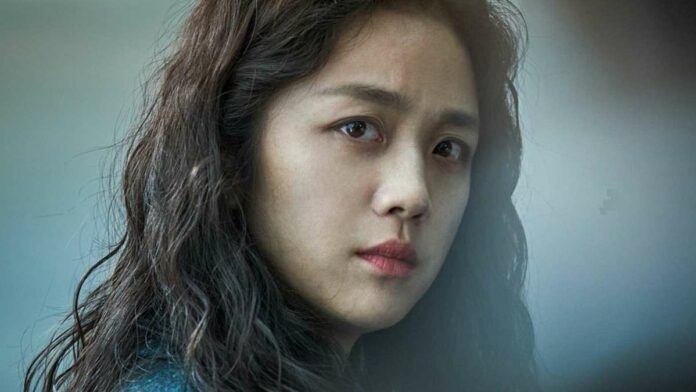Song Seo-Rae is an enigmatic woman whose deceit could easily make her the perfect antagonist in an ordinary crime drama. She brings Hae-jun (a detective) to his demise through her charm and deception. If one watches “Decision to Leave” expecting to see a basic crime thriller, that is the direction in which their mind would take them. The word “mystery” is most commonly associated with “dark” or “baffling,” making one feel such characters are intrinsically “bad” or “anti-heroic.” Even when we know that Seo-Rae has murdered her husband, we find ourselves rooting for her survival and not just tachat but also encouraging the brewing romance between her and the detective who is meant to catch her. Seo-Rae is a person of desperation who acts on her survival instinct until she is swept away by Hae-jun, the only “man” in her life who sees her for who she is and never tries to take advantage of her because of the position she is in, even when he is a detective, and she is his prime suspect. While Seo-Rae does fall deeply in love with Hae-jun, her initial infatuation begins because of this very fact. Her abusive past almost puts Hae-jun on a pedestal, and she finds herself reaching for him even when he is stalking her on the pretext of her being a suspect. Seo-Rae is a very caring and helpful person works as a nurse for a living. Her nature is that of a caregiver, and this is what leads to her impending doom.
It may be difficult to separate the art from the artist in this particular situation, as if Tang Wei weren’t Seo-Rae, would we get such an alluring character who is not just able to charm her way through the film itself but also reach out to the audience and make us, in an almost voyeuristic manner, obsessed with her? They say the protagonist is always the center of a film, and “Decision to Leave” begins as a movie about detective Hae-jun, but it is Seo-Rae, the “love interest” or “anti-hero” who carries the weight of the movie as well as the burden of bringing Hae-jun back up from his “collapse.” It is she who is remembered for hours after it is over and the reason for our tear-stained faces (if you’re one to cry at movies). In her initial interrogation, she quotes Confucius’ (a Chinese philosopher) statement, which relays that the wise are like water and the benevolent are like mountains. She claims she is one who likes water, meandering through all her problems, finding a way, and fitting through the cracks to survive. Like the sea, she is able to conquer any obstacle and make her way through life by changing (the wigs, the places, the husbands). The ocean plays a huge part in Seo-Rae’s existence, and Park Chan Wook makes it very clear by giving us as many details as possible to see this. Her wallpaper is ocean waves, most of her clothing is blue-green, and the books she writes in and reads from are covered with ocean art. She is unstable, ever evolving, and unattainable, like the vast ocean she finally ends up embracing. When she is aiding Hae-jun to quell his insomnia, she instructs him to believe he’s like a jellyfish in the ocean, guided by her breathing (the waves of the ocean). Her arrival in South Korea is also through the ocean, on a cargo ship, which lands her in trouble as they arrive in this new land. It is this detail in subtlety that makes us encourage Seo-Rae as a character to pursue Hae-jun.
Seo-Rae uses Hae-jun’s voice notes of his “confession” to her as a reminder to herself that someone in the world truly cares about her. She is stuck on the longing she feels towards Hae-jun, who is the only person she wholeheartedly trusts. It is evident that “Decision to Leave” would not pass the Bechdel test, but we’re ready to forgive that because of our “quench” for the character by the end of the film. The main track on the film score of the film is also named after her, and it is as serene and enticing as the great ocean, bringing everything together seamlessly. “When you said you loved me, your love ended. When your love ended, mine began”, a terrible way to say goodbye and one that Hae-jun doesn’t even understand as she speaks it in Chinese, leaving us haunted for the last five minutes of the movie, revealing what may be the inevitable end. A true sense of trust is felt when Seo-Rae and Hae-jun share a moment on the mountain, where he wordlessly spreads the ashes of her grandparents in their ancestral home. It is evident to anyone watching that Seo-Rae and Hae-jun’s love is built on chasing and the absence of each other, and they’re both aware of the fact that if it went beyond that, there would be no love left.
When Seo-Rae digs up a hole in the ocean to end her life, a mountain of sand is created, which eventually gets washed away by the ocean. This scene, while visually a masterpiece that can only give one the feeling of peace and beauty, is unfortunately always going to remind us of the somber ending of “Decision to leave.” Ultimately, Seo-Rae “decides to leave” for the sake of Hae-jun’s career and life. She is certain that just as the mountain and the ocean should not meet, their meeting would only lead to catastrophe. Just as he had told her to throw the phone in the ocean, she left him with protection and no evidence of his “love” for her by removing the last factor from the picture. Herself.

